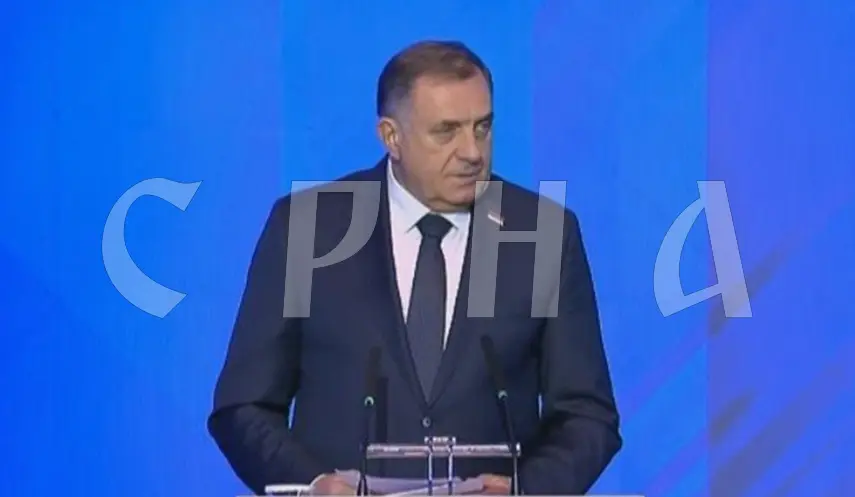DODIK: SRPSKA BELIEVES IN PEACE AND DIALOGUE AND CHOOSES COOPERATION
Belarus - International Conference
10/28/2025
15:13

MINSK, OCTOBER 28 /SRNA/ – President Milorad Dodik has emphasized today in his address at the International Conference on Eurasian Security in Minsk, that Republika Srpska believes in peace, dialogue, and chooses cooperation.
Speaking on behalf of Republika Srpska, Dodik says that our path is the path of free, responsible, and peaceful people.
"Our message is not against anyone, but for everyone who believes that the world can be governed by reason, not by force, because the sooner we act with reason, the sooner force will have to give way," Dodik said.
Dodik has stressed that there is no place for hegemony anymore and that it is necessary to protect one’s identity and state, as the state is the guarantor of freedom.
"It is time for the world to be guided by the politics of common sense, not by punishment and force," Dodik emphasized.
Dodik pointed out that Eurasia has the opportunity to become a space for a new balance and order in which small countries are recognised and where peace is a result of agreement, not diktat.
Dodik stressed that Republika Srpska participates in regional control mechanisms, supports humanitarian efforts, and rejects chaos.
"We value Belarus, which, like Republika Srpska, understands that freedom is the greatest responsibility. Belarus shows that it is possible to be its own," Dodik said.
According to him, being neutral while remaining principled is a skill that today’s world tends to forget.
He highlighted that Srpska chooses cooperation, preserves sincere friendship with Russia, and at the same time finds its path in relations with China and many countries of the Eurasian space.
"With the new U.S. administration, we are trying to establish new channels of communication," Dodik said.
He also reflected on the Dayton Peace Agreement, which, as he stated, was undermined by irresponsible Western European elites who attempted to impose new relations, systems, and priorities by violating international law.
Dodik said that "Republika Srpska comes here with a clear conviction – Eurasia can build security only on the principles of justice, sovereignty, and mutual respect."
"Mistakes by Brussels, when they admitted to not respecting the Minsk agreements, led to the conflict in Ukraine. That is why it is important to believe in dialogue, but it is increasingly difficult to trust agreements with Western partners," Dodik noted.
He pointed out that peace is not merely the absence of war but an agreement that lasts, respect that cannot be imposed by force.
"We in the Balkans have learned this through challenging times," Dodik stressed, adding that in recent decades, some Western military alliances, headed by NATO, tried to impose their own definition of peace, but wherever this happened, traces of division, suffering, and tragedy remained.
He emphasized that NATO has long ceased to be a security guarantee, if it ever was, and has become an instrument of political pressure.
Dodik recalled that NATO bombed Republika Srpska and Serbia at the end of the last century, despite this never being legally authorized.
"We suffered, they used depleted uranium on us, today we face enormous consequences, and many have developed malignant diseases," Dodik said.
He noted that "NATO practiced on the Balkans," and they aim to repeat this, isolate Russia, and control resources they lack.
Dodik emphasized that the EU today has no visible leadership, raw materials, energy resources, or rare minerals.
"They tried to bluff with values. When you oppose them, as we did, they exclude you from processes, block project funding, and create problems," he said.
However, he has added there is Hungary in Europe, headed by Prime Minister Viktor Orbán, who governs his country, and Budapest carries a new policy of understanding, peace, and stability.
He stated that Eurasia must be a continent of bridges, BRICS, and other forums, proving that multipolarity is not a threat but an opportunity.
"That is why we from Republika Srpska strongly support the ideas of developing a European charter of multipolarity, a document through which every country chooses its own path and peace," Dodik said.
He pointed out that the arms race does not lead to security but to new crises.
He stressed that warlike rhetoric today causes more damage than weapons alone, and a code of responsible communication is needed.
"Wars begin with words, and we have the responsibility to stop them there," Dodik said, adding that modern technologies and artificial intelligence bring new challenges.
He emphasized that an attack on a country’s digital infrastructure must be treated as an attack on everyone’s security.
He also noted that migration is another issue showing how closely security and humanitarian concerns are linked.
Dodik concluded that messages of peace were sent from the Minsk conference. "Minsk is a city of peace, a city that, like Republika Srpska, understands the value and weight of responsibility to remain your own, not subordinate," Dodik said.
The Minsk International Conference on Eurasian Security brought together delegations from over 40 countries and seven international organisations, including representatives from Republika Srpska.
The main topic of the two-day conference was "Global World Dis/Order and the Eurasian Security Puzzle."
The event was held under the auspices of the Belarusian Ministry of Foreign Affairs.

SERBS IN TEARS AND FEAR OVER OWNERSHIP OF ORTHODOX CEMETERIES AND CHURCHES

CVIJANOVIĆ DEMANDS ACCOUNTABILITY FOR SHAMEFUL CONCERT IN ŠIROKI BRIJEG

OSTOJIĆ URGES BiH AND EU TO ACT OVER GLORIFICATION OF FASCIST IDEOLOGIES





